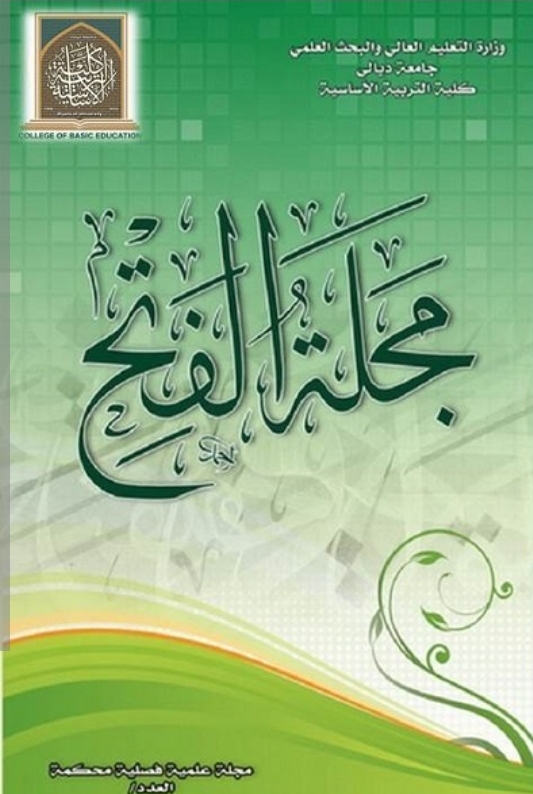أثر مرحلة التعليم النظري على ممارسة معلمي اللغة الإنجليزية قبل الخدمة من وجهة نظرهم
الكلمات المفتاحية:
التعليم النظري، المعلمين قبل الخدمة، الممارسات، الارتباط,الملخص
هدفت هذه الدراسة إلى التعرف على الدور الذي يلعبه التعليم النظري في ممارسة معلمي اللغة الإنجليزية في مرحلة ما قبل الخدمة في جامعة أم القرى في الفصول الدراسية من وجهة نظرهم، وإذا كان ذلك يعكس ارتباطا حقيقيا بين النظرية والتطبيق. تم تطبيق منهج الدراسة هم باستخدام استبيانا لجمع البيانات. المشاركون في الدراسة هم الطلاب الذين درسوا في كلية التربية في جامعة أم القرى للفصل الدراسي الثاني من السنة 2016/2017. وتشير النتائج إلى وجود علاقة ذات دلالة إحصائية (إيجابية، سلبية) بين جودة مرحلة التعليم النظري وممارسات معلمي اللغة الإنجليزية قبل الخدمة في فصولهم. كما توجد فروق ذات دلالة إحصائية في التعبير عن التنسيق بين النظرية والتطبيق.
المراجع
References
Allen, J. Wright, S. (2014). Integrating theory and practice in the pre-service teacher education practicum. Teachers and Teaching: Theory and Practice. 20. 10.1080/13540602.2013.848568.
Bransford, J., Darling-Hammond, L. LePage, P. (2005). Introduction. In L. Darling Hammond & J. Bransford (Eds.), Preparing teachers for a changing world: What teachers should learn and be able to do (pp. 1-39). San Francisco: John Wiley and Sons.
Bullough, R. Gitlin, A. (1994). Challenging teacher education as training: Four propositions. The Journal of Education for Teaching, 20(1), 67-81.
Burns, A. Richards, J. (2009). Introduction. In A. Burns & J. C. Richards (Eds.), The Cambridge guide to second language teacher education (pp. 1-8). New York: Cambridge University Press.
Cheng, M. Cheng, A. Tang, S. (2010): Closing the gap between the theory and practice of teaching: implications for teacher education programs in Hong Kong. Journal of Education for Teaching, Vol 36, No. 1, pp. 91-104.
Dooly, M. Sadler, R. (2013). Filling in the gaps: Linking theory and practice through telecolaboration in teacher education. ReCALL, 25, 4-29.
Ersanlı, Y.C. (2016). Investigation of pre-service English language teachers’ cognitive structures about some key concepts in approaches and methods in language teaching course through word association test. Journal of Language and Linguistic Studies, 12(1), 124-136
Freeman, D. (2002). The hidden side of the work: Teacher knowledge and learning to teach. Language Teaching, 35, 1-13.
Hammerness, K. Darling-Hammond, L. Shulman, L. (2002). Toward expert thinking: How curriculum case writing prompts the development of theory-based professional knowledge in student teachers. Teaching Education, 13(2), 219 - 243.
Hammerness, K. Darling-Hammond, L. Bransford, J. (with Berliner, D., Cochran-Smith, M., McDonald, M., & Zeichner, K.). (2005). How teachers learn and develop. In L. Darling-Hammond & J. Bransford (Eds.), Preparing teachers for a changing world: What teachers should learn and be able to do (pp. 358-389). San Francisco: Jossey-Bass
Light, G. Cox, R. (2005). Learning & teaching in higher education: The reflective professional. Thousand Oaks, CA, Sage.
Loughran, J. J. (2006). Developing a pedagogy of teacher education: Understanding teaching and learning about teaching. London, England: Routledge.
Lovat, T. (2007a). Synergies and Balance between Values Education and Quality Teaching. Paper presented at the Moral Education and Australian Values Conference. Retrieved 28 November, 2010 from.
Malin, G. (2010). 21st Century Fieldwork: How Pre-Service Teachers Connected Theory and Practice in a Hybrid High School Setting. MERLOT Journal of Online Learning and Teaching. Vol. 6, No. 4, December 2010.
Merrill, M. D. (2009). First principles of instruction. In C. M. Reigeluth & A. Carr (Eds.), Instructional design theories and models: Building a common knowledge base (Vol. III, pp. 41–56). New York, NY: Routledge.
Paulin, A. (2006). A study of the difficulties that the newly qualified teachers meet during their first terms of teaching. Studies in Educational Sciences, 96. Stockholm, Sweden: HLS Forlag.
Queensland College of Teachers. (2007). Program approval guidelines for preservice teacher education. Toowong, Qld: Queensland College of Teachers, http://www.qct.edu.au/
Seferoğlu, G. (2006). Teacher candidates’ reflections on some components of a pre-service English teacher education program in Turkey. Journal of Education for Teaching, 32 (4), 369-378.
Ross, J. A. Bruce, C. D. (2007). Teacher self-assessment: a mechanism for facilitating professional growth. Teaching and Teacher Education, 23(2), 146e159.
Seferoğlu, G. (2006). Teacher candidates’ reflections on some components of a pre-service English teacher education programme in Turkey. Journal of Education for Teaching, 32 (4), 369-378.
Smith, K. Lev-Ari, L. (2005). The placement of the practicum in pre-service teacher education: The voice of the students. Asia-Pacific Journal of Teacher Education, 33(3), 289-302.
Tang, E. (2009).Hong Kong Secondary school English teachers’ perception of the values of mentoring of pre-service teachers. VIENNA ENGLISH WORKING PAPERS. VOLUME 18, p: 133.
Zeichner, K. (2010). Rethinking the Connections between Campus Courses and Field Experiences in College- and University-Based Teacher Education. Journal of Teacher Education, 61(1-2), 89-99.
التنزيلات
منشور
كيفية الاقتباس
إصدار
القسم
الرخصة
الحقوق الفكرية (c) 2023 عدوية طالب احمد شواقفة

هذا العمل مرخص بموجب Creative Commons Attribution 4.0 International License.
حقوق النشر والترخيص
تطبق مجلة الفتح للبحوث التربوية والنفسية ترخيص CC BY (ترخيص Creative Commons Attribution 4.0 International). يسمح هذا الترخيص للمؤلفين بالاحتفاظ بملكية حقوق الطبع والنشر لأوراقهم. لكن هذا الترخيص يسمح لأي مستخدم بتنزيل المقالة وطباعتها واستخراجها وإعادة استخدامها وأرشفتها وتوزيعها ، طالما تم منح الائتمان المناسب للمؤلفين ومصدر العمل. يضمن الترخيص أن المقالة ستكون متاحة على نطاق واسع بقدر الإمكان وأن المقالة يمكن تضمينها في أي أرشيف علمي.
لمزيد من المعلومات، يرجى متابعة الرابط: https://creativecommons.org/licenses/by/4.0/.


